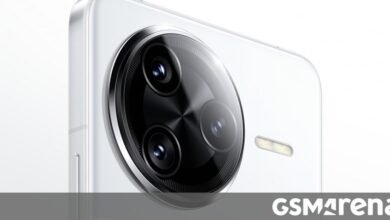Apple iPhone 16 vs. Samsung Galaxy S24

Compact smartphones are scarce these days, and if you narrow your search only to the premium segment, the choice becomes even more limited. Still, Apple and Samsung have the Apple iPhone 16 and the Samsung Galaxy S24 that fit the criteria. One could argue that these phones don’t check all the boxes of a flagship device, but they are close enough.
The two contenders are also relatively cheaper than their more premium siblings, hitting the sweet spot for some potential buyers. And after all, the Samsung vs. Apple dilemma is still a thing in some markets, even though the vanilla iPhone 16 isn’t off to a great start as it asks about €250 more than its direct rival in Europe and the gap gets even wider in the US.
Table of Contents:
For starters, you can compare the complete specs sheets or directly continue with our editor’s assessment in the following text.
Size comparison
Even though the iPhone 16 and the Galaxy S24 are built by two very different companies, you’d be surprised by how many similarities you can find.
The two handsets are very similar size-wise, with the Galaxy S24 having a slight edge over the iPhone 16 because it’s a tad narrower, shorter and thinner, while offering a bigger display with larger screen real estate. In short, you are getting more display in the same footprint.
The vanilla iPhone 16 and Galaxy S24 also share similar design language. The side frames and front and back panels are flat with the camera lenses sticking out. Build quality is, for all intents and purposes, comparable. Both devices use Corning-made glass panels for the front and back, joined by an aluminum side frame. The two bodies are IP68-rated too, though Apple promises a resistance up to bigger depth (1m vs. 6m).
Display comparison
The iPhone 16 and the Galaxy S24 make no compromise when it comes to display quality. Both panels support the same HDR standards and both can get pretty bright. According to our tests, the iPhone has a slight edge with 300 nits more.
However, the S24 wins this round by having a 120Hz LTPO OLED. The iPhone 16’s display settles for a less-than-ideal 60Hz refresh rate in 2024.
Battery life
When it comes to battery life, the iPhone 16 is the clear winner here. It dominates the Galaxy S24 on every front, but it’s particularly impressive in the web browsing scenario, where it beats the S24 with almost double the runtime. The iPhone 16 also posts significantly better video playback and call scores.
It’s quite evident that if you value battery life the most, the iPhone 16 is the right choice here.
Charging speed
The iPhone 16 and the Galaxy S24 offer equally fast charging solutions, for the most part. Or should we say they are equally slow?
In any case, if you look strictly at the total time required to charge the device, the S24 beats the iPhone 16 by almost 20 minutes. We’d say that’s sensibly faster.
However, the charging curve in the first 15 to 30 minutes is almost identical as the two devices will give you almost 60% of the charge back in 30 minutes.
Speaker test
The iPhone 16 and the Galaxy S24 offer equally loud stereo speakers, but the former has the upper hand regarding quality. It’s quite obvious that Apple’s phone has a warmer and deeper sound thanks to the well-pronounced bass. The vocals aren’t muffled either.
On the other hand, the Galaxy’s speakers are lacking in the lows and sound downright flat.
Performance
The iPhone 16 runs on Apple’s A18 chip, while the Galaxy S24 gets the Exynos 2400. Apple’s new chip makes its way to the non-Pro versions this year and promises a substantial increase in performance, efficiency and AI capabilities. Historically, Apple’s silicon offers better performance than its Android counterparts, but the 10-core Exynos 2400 packs a punch too. It also uses a GPU co-developed with AMD.
Both handsets disappoint when it comes to base storage. The S24 and the iPhone 16 start from 8GB/128GB and reach up to 8GB/512GB.
One small detail to keep in mind – the iPhone 16 has NVMe storage, while the S24 settles for UFS 3.1 for its base 128GB variant and UFS 4.0 for all others. In both cases, the S24 is slower than the iPhone 16. Not that storage speed is of great importance anyway.
Benchmark performance
One would expect the iPhone 16 to be objectively the more powerful device. And this is true for the most part. It beats the Galaxy S24 in Geekbench 6’s multi-core scenario by 17%, which is a pure CPU-bound benchmark test, while in GPU-heavy workloads like 3DMark Wild Life Extreme, it drags behind the S24 by 5%. Not a big difference, but a notable one.
Camera comparison
Both the iPhone 16 and Samsung Galaxy S24 feature similarly capable main cameras, each utilizing 48MP sensors. Where they differ more is in their telephoto and ultrawide setups. The Galaxy S24 comes equipped with a 3x telephoto camera, giving it a slight edge in optical zoom range over the iPhone 16, which lacks a dedicated telephoto lens.
On the ultrawide front, both devices offer high-resolution performance, but the iPhone’s ultrawide has the added advantage of autofocus, a feature the Galaxy S24’s lacks, allowing the iPhone to handle close-up shots more adeptly.
Selfie camera capabilities are also well-matched, with both phones sporting 12MP sensors and similar focal lengths, making them competitive for front-facing photos and video calls.
Image quality
There’s not much competition here, to be completely honest. The iPhone 16 produces better-looking stills day and night with its main and ultrawide cameras. The stills just look cleaner, more detailed, sharper and with less noise, if any, at night.




Galaxy S24: 0.6x • 1x • 2x • 3x
The 2x crop zoom photos on the iPhone are so much better that it’s not unreasonable to think that the 3x crops from the iPhone will look better than the 3x telephoto stills from the S24.
Perhaps the only advantage that the Galaxy S24 has is the processing. Samsung’s phone produces generally more likable colors, even with the new, more natural processing on the S24 series. The iPhone photos are flatter.
Video quality
The same goes for the videos. The iPhone 16’s clips are noticeably better. They’re sharper, cleaner and resolve more detail.
Below we have a few framegrabs from the videos taken by the two phones at each focal length so they are easier to compare to one another.




iPhone 16 video screengrabs: 0.6x • 1x • 2x • 1x




Galaxy S24 video screengrabs: 0.6x • 1x • 3x • 1x
Verdict
For the most part, the iPhone 16 is the better device. It lasts longer away from the charger; its display is brighter (albeit missing high-refresh-rate support); it has better-sounding speakers; it has generally more powerful SoC, and it provides a better camera experience overall.
The Galaxy S24’s smoother display, slightly faster charging, 3x optical zoom cam and lower price tag are the only advantages. Your potential preference for Android could help tip the scales too, but if you are one of those rare users not married to either ecosystem and have the expendable budget, the iPhone 16 is the clear choice for you.
- The brighter display.
- The nicer speakers.
- The more powerful CPU.
- The generally better camera experience.
- The iOS ecosystem.
Get the Apple iPhone 16 for:
Source link
















